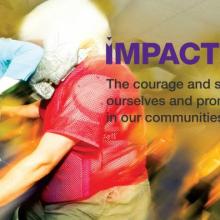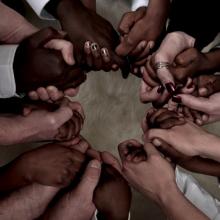self-defense
THE LEADING CAUSE of death for children in 2020 wasn’t COVID-19. It wasn’t cancer. And it wasn’t car crashes. Rather, more than 4,300 of our children in the United States died by firearms — the first time in at least 40 years that guns have accounted for more deaths than motor vehicle incidents.
The numbers are stark: More than 110 people in the U.S. are killed every day with guns, while more than 200 others are shot and wounded. “Gun violence in any form — any form — leaves a mark on the lives of those who are personally impacted,” Giselle Morch, a deacon and mother whose son, Jaycee, was shot and killed in their home, told Sojourners. “So many of us will never be the same.”
On July 19, 2017, Morch took her grandson to Vacation Bible School, where she played the role of the Lord in a skit from Judges about Gideon and the Midianites. “One of the lines was ‘For God and for Gideon,’” Morch said. “And when I got home, that’s when the battle was: That’s when my own son was murdered — my son who said, ‘I may not change the world, but I want to inspire many.’”
One thing about the senseless loss of Jaycee has always been clear to Morch: “This could have been prevented.” Shortly after he was killed, Morch began volunteering with Moms Demand Action for Gun Sense in America to advocate for cultural and legislative change. She has since joined Everytown for Gun Safety’s Survivor Fellowship Program to connect with others who have been impacted by gun violence. “There are others in this movement, because it’s not a moment,” Morch said. “A moment was when my son died; a movement is the call to action to make the change so that nobody else does.”
Death is horrible enough. But systematic injustice — one that allows white boys to assume success, yet leads black boys to cower from the very institutions created to protect our own wellbeing — is a travesty. Listen to the stories from Saturday and Sunday nights, of 12-year-old black boys who asked to sleep in bed with their parents because they were afraid. If black youth in America can’t rely on the police, the law, or their own neighborhood for protection — where can they go?

IMPACT:Ability. http://www.triangle-inc.org
Through the wreckage of the Penn State abuse scandal, we’ve all become witnesses to what happens when our principles of justice are not assured for those who most need them.
When we see people in positions of power and authority — particularly those who have held a huge amount of respect and clout in a community — fail to protect the vulnerable in our society, it moves something within society’s collective conscience.
I imagine that the questions people all around the country asked when the news broke were similar:
How could this happen? Who wasn’t living up to our expectations? How can we make sure that something like this never happens again?

